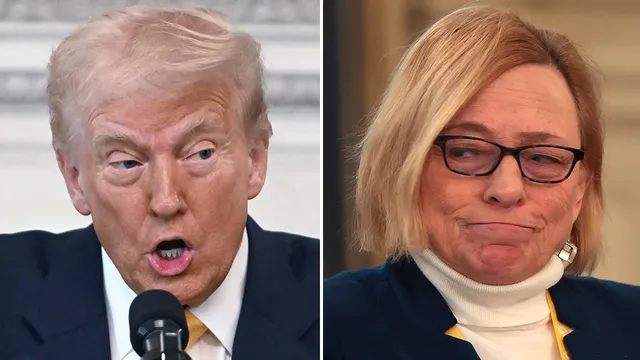
Trump administration unfreezes funding for Maine amid trans athlete dispute
2025-05-03 01:58- The Trump administration initially froze federal funds for Maine's child nutrition program due to a disagreement over transgender athletes.
- Maine filed a lawsuit against the Trump administration, claiming that the funding freeze threatened essential nutrition services.
- The Trump administration ultimately agreed to unfreeze the funds, prompting Maine to drop its lawsuit, highlighting the contentious issue of transgender athlete participation in sports.
Express your sentiment!
Insights
In the United States, specifically in Maine, a notable legal conflict emerged between the Trump administration and the state government concerning funding for child nutrition programs. This dispute revolved around the federal government's suspension of funds due to Maine's non-compliance with an executive order aimed at barring transgender athletes from participating in girls' sports. The funding freeze raised concerns about the distribution of over $1.8 million expected for the current fiscal year, which was crucial for state-operated nutrition programs aimed at feeding children and vulnerable adults. Maine's Attorney General Aaron Frey voiced his displeasure regarding the situation, stating that legal action became necessary for the USDA to follow federal regulations and provide the funds as previously allocated. As a result of the suspension, Maine swiftly filed a lawsuit against the U.S. Department of Agriculture. This legal action was taken in response to the federal government's decision, which was tied to Secretary Brooke Rollins's interpretation of Title IX, the federal law prohibiting sex-based discrimination in education. Maine's officials asserted that the funding was vital for continuing their nutrition programs, which serve a significant number of children and adults in need. The state highlighted that the inability to access these funds was impeding their capacity to operate essential services, thereby prompting legal intervention. In a positive development for Maine, a federal court ruled in favor of the state, determining that it was likely to succeed in its legal challenge against the funding freeze. The judge's decision compelled the Trump administration to restore the federal funds, leading to a cessation of efforts to maintain the freeze. Subsequently, on a recent Friday, both parties reached a settlement where Maine dropped its lawsuit, indicating a resolution to the ongoing feud over transgender athletes in sports. Attorney General Frey expressed relief at the unfreezing of funds, emphasizing the importance of adhering to federal law while acknowledging the unfortunate necessity of utilizing the courts to enforce compliance. This agreement also indicates a larger issue surrounding federal compliance and state rights over transgender policies and funding, as the Trump administration previously launched a lawsuit against Maine for its stance on allowing transgender athletes to compete in girls' sports. The Department of Justice criticized Maine's policies, framing them as violations of Title IX, which led to heightened tensions between the federal government and the state. This entire incident illustrates the complex legal landscape surrounding education, sports, and the rights of transgender individuals, reflecting the ongoing national debate on these issues.
Contexts
Title IX of the Education Amendments of 1972 is a landmark piece of legislation that prohibits discrimination based on sex in any education program or activity receiving federal funding. Its implications for transgender athletes have become a significant topic of discussion as more transgender individuals seek to participate in sports consistent with their gender identity. The intersection of Title IX and transgender rights is complex, involving legal interpretations, societal attitudes, and the evolving landscape of athletic competition. With an increasing number of states gaining attention for legislation that either supports or restricts the participation of transgender athletes, it has become vital to evaluate how these dynamics affect both the athletes themselves and the institutions that govern their participation in sports. The U.S. Department of Education has issued guidance that underscores the importance of inclusive practices under Title IX, suggesting that schools and institutions should have policies in place that allow transgender students to compete in accordance with their gender identity. This guidance aligns with wider social movements advocating for LGBTQ+ rights and recognition. However, these policies have sparked significant debate regarding fairness in competitive sports, as opponents argue that allowing transgender women (assigned male at birth) to compete against cisgender women may create an uneven playing field. Proponents, on the other hand, argue for the essential right of transgender athletes to participate fully in society and the necessity of more nuanced considerations of performance and equity in sports. Furthermore, the legal landscape surrounding Title IX's application to transgender athletes is continually evolving. Recent court rulings have varied in interpretations of the law, with some courts reinforcing the rights of transgender individuals to compete in alignment with their gender identity, while others have upheld state laws that restrict such participation. This inconsistency raises critical questions about the future of Title IX as it relates to transgender athletes, including how federal and state laws interact and the potential for further litigation to clarify these issues. Additionally, many educational institutions are grappling with how to implement policies that comply with Title IX while also ensuring a safe and competitive environment for all athletes. As awareness and understanding of gender identity develop, the dialogue surrounding transgender participation in sports will likely continue to evolve. Educators, policymakers, and sports organizations must engage in ongoing discussions that consider the perspectives of all stakeholders, including athletes, parents, coaches, and the broader community. Finding a balance between inclusivity and fair competition will be crucial in shaping the future of athletics under Title IX. This conversation not only impacts the lives of individual athletes but also reflects broader societal challenges related to identity, equity, and the pursuit of justice in sports.